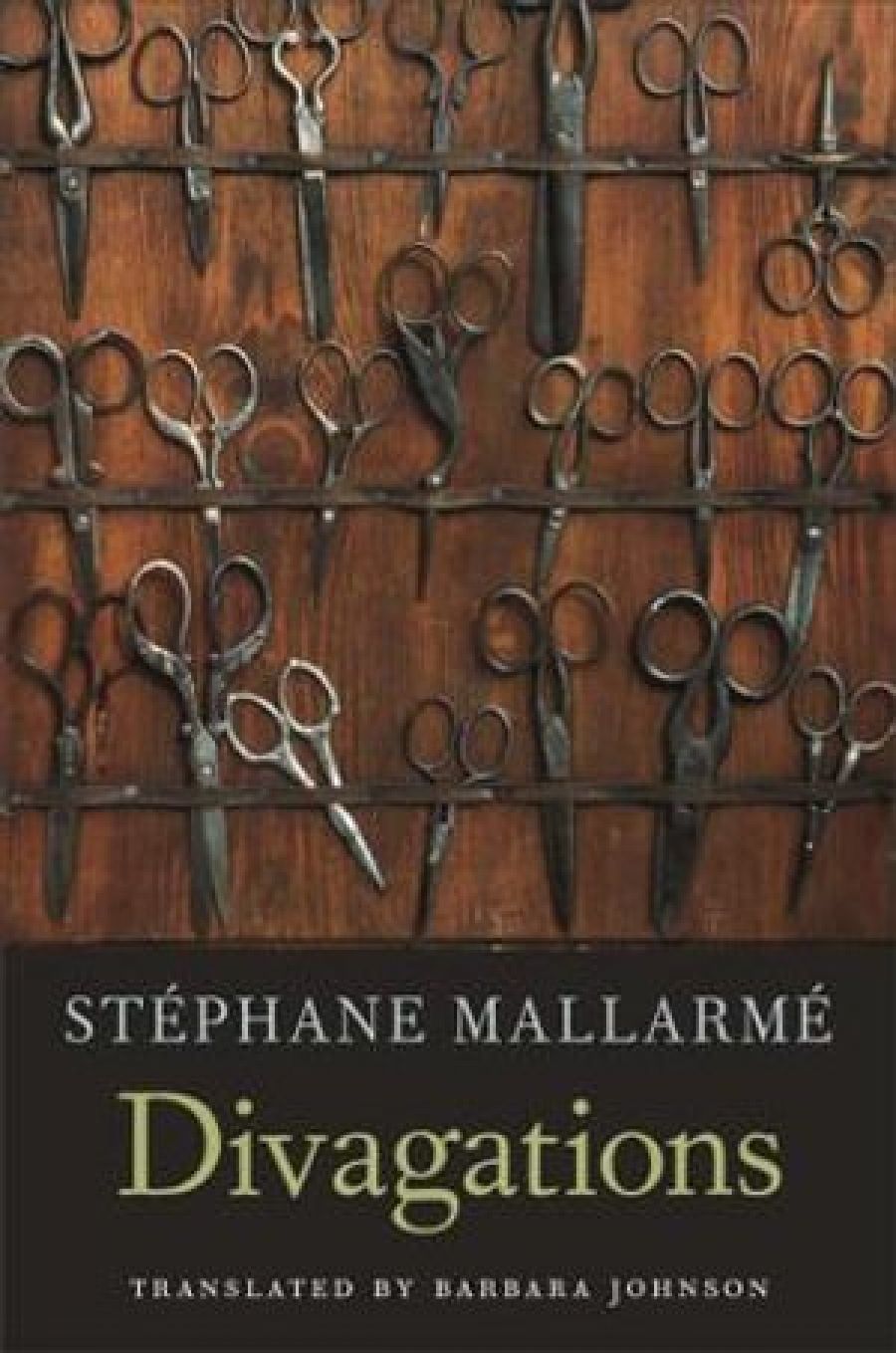
- Free Article: No
- Contents Category: Poetry
- Review Article: Yes
- Article Title: Mallarmé’s miscellany
- Online Only: No
- Custom Highlight Text:
Toward the end of his life, Stéphane Mallarmé (1842–98), French poet and founding father of Symbolism, published the prose collection Divagations (1897). This highly ambitious, eclectic work, a repository of Mallarmé’s aesthetic, revitalises the critical enterprise and shakes the very foundations of the literary act. His practice is inaugural, effecting a critique of the subject and of poetry that is unprecedented. Divagations shows the mature Mallarmé at the height of his achievement, inventing a new form of poetic journalism. From the outset, we are invited to read differently. These consummate, diverse pieces, comprising prose poems, lectures, journalism and portraits, are truncated from their original context and strategically redeployed. They illuminate each other differently and acquire a new potency, in tune with the poet’s vision of words in verse interacting like reflective jewels. The dazzling pieces on dance and current events provide a radical critique of contemporary values and show a sense of humour more familiar to readers of Mallarmé’s fashion journal. High and low interchange as the apparently trivial or frivolous acquires seminal status. The ‘Important Miscellaneous News Items’ offer some of the greatest examples of the new ‘Popular Poem’, celebrating the insight and autonomy of the modern reader.
- Book 1 Title: Divagations
- Book 1 Biblio: Harvard University Press, $59.95 hb, 246 pp
- Book 1 Readings Link: https://www.booktopia.com.au/divagations-stephane-mallarme/book/9780674032408.html
Barbara Johnson’s magisterial translation into English brings together for the first time the whole collection, based on Bertrand Marchal’s definitive new edition in La Bibliothèque de la Pléiade. Why is it so important to read Divagations in its entirety? ‘No thought ever presented itself to me in isolation,’ reflects Mallarmé in 1898. These thoughts have ‘the configuration, musically situated, of a whole’, so that to isolate them would be to betray their truth. As the preface reads, ‘any coherence found in the book was aided by its assembly’. Composition is crucial, despite the author’s description of Divagations as ‘scattered, and with no architecture’. Johnson picks up on this remark by a poet whose highest ambitions were expressed in musical terms. Slightly changing the order of the original, she foregrounds Mallarmé’s new aesthetic of the critical poem.
Mallarmé’s famous lecture ‘Music and Letters’, delivered in Oxford and Cambridge in 1894, here inserted between ‘Scribbled at the Theatre’ and ‘Crisis of Verse’, elevates the cultural chronicles to a higher plane, suggesting new relations between journalism of the everyday and the uppermost poetic realm. Most importantly, opening the volume with ‘Autobiography’, a letter to Verlaine written in 1885, allows Johnson to bring home more forcefully the new aesthetic of the fragment and the revolutionary poetics enacted in the collection. Beginning and end now mirror each other, with ‘Autobiography’ anticipating the final piece, ‘Mallarmé’s Bibliography’. They resonate anew to form an avant-garde manifesto. Far from being a perfunctory listing of the volume’s contents, ‘Bibliography’ is a seminal piece in itself, speaking of the new writing put into practice there: ‘a new form, perhaps, comes out of it, timely, permitting what was long called the prose poem, and our research, to become, with a new joining of words, the critical poem.’
Barbara Johnson’s enhanced focus on marginal pieces fuels the ongoing debate as to what portion of the Book exists. New light is shed on the poet’s celebrated failure to achieve his dream. Whereas in ‘Autobiography’ the poet despaired of attaining his Orphic vision of the Book, ‘Bibliography’, written over a decade later, confidently asserts the dream can be realised via creation of a supple new musical prose.
Mallarmé redefines personal and social space in Divagations, and Johnson assists our understanding of this process. In ‘Autobiography’, the poet paradoxically speaks of his personal work as ‘anonymous … without the voice of an author’, inspiring a paradigm shift in twentieth-century criticism. Major pieces in Divagations depict emblematic figures expressing the most intimate desires of a contemporary audience in the spectacle of the future. In Wagner’s theatre, the impersonal actor becomes ‘the Figure that No One is’, an Everyman encompassing our dreams on an empty stage. In ‘Ballets’, ‘dance … is a moving synthesis of the attitudes of each group’. The dancer is a not a woman, but a metaphor or sign, transcribing our vision silently. ‘There results a reciprocity producing the un-individual.’
Closer scrutiny of the collection according to the new dynamic set up by ‘Autobiography’ encourages perception of the highly personal. Mallarmé speaks intimately to, and in place of, his others, like Villiers, Manet or Morisot. ‘Bucolic’, one of the ‘news items’, is a prime example of the staging of a new self. Just as the personal letter to Verlaine is co-opted as a critical poem, so musings on dance and the theatre and ceremonial addresses perform a broader critical function than ephemeral pieces on current events. Reporting in the newspaper was for Mallarmé initially a form of instrumental language inimical to the poetic. Divagations reconciles the two with its rhythmic innovations, sophisticated reworking of different registers and multiplicity of voices.
As critic and as author of the celebrated The Critical Difference (1980) and A World of Difference (1987), Barbara Johnson is ideally placed to understand the subtleties of such powerful texts, drawing attention early on to the revolutionary nature of Mallarmé’s poetics in the prose poem ‘The Demon of Analogy’. As translator, she conveys these to the reader in fluid and accessible form without sacrificing any nuances, using at times a racy modern idiom that captures the flavour of Mallarmé’s endeavour. The result is a compelling volume, offering reinterpretations of poems that command our attention. I pay tribute to such a major undertaking.


Comments powered by CComment